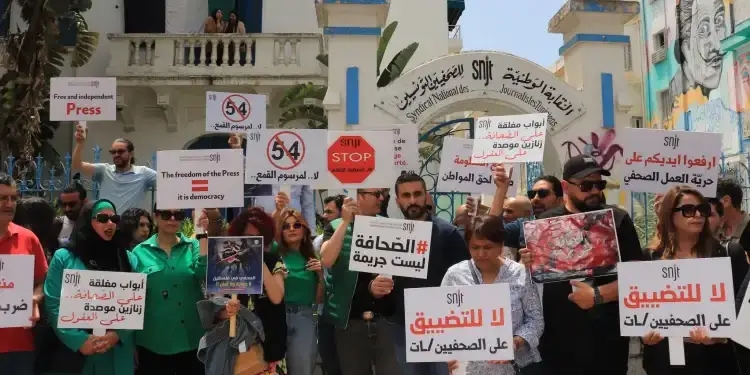In its annual report presented on Saturday May 3, 2025 on the occasion of World Press Liberty Day, the National Union of Tunisian Journalists (SNJT) identified 167 attacks on journalists, photographers and correspondents, between April 2024 and April 2025.
Although this figure is down compared to previous years (211 in 2024, 252 in 2023, 204 in 2022), the union denounced continuous deterioration in the media environment, marked by intimidation, censorship, legal proceedings and obstacles to access to information, reports the TAP agency.
The SNJT notably underlines the incarceration of several journalists for their opinions, including Chadha Hadj Mbarek, Sonia Dahmani, Borhen Bsaies and Mourad Zeghidi. A total of ten prison terms were pronounced this year, including six executed, one postponed and three during the appeal.
The report highlights systematic restrictions on access to information, the multiplication of required authorizations and administrative practices that hinder journalistic work. This context is accompanied by a persistent incentive against journalists in the digital space, contributing to an atmosphere of insecurity and the proliferation of false information for the benefit of the official version alone.
The union also deplores the absence of HAICA, the audiovisual regulatory body, which led to a deterioration in media content and an increase in legal proceedings. He alerts the maintenance of the decree-law n ° 2022-54, described as a tool for the repression of freedom of expression, and whose amendment proposal has remained a dead letter.
The SNJT challenges the authorities on the marginalization of the profession, recalling that the guarantee of the economic and social rights of journalists is essential for a free, credible and pluralist press. He calls on the Presidency of the Republic to initiate new laws in favor of press freedom, guarantee equitable access to information and include all media in national and international events.
He also insists on the importance of the opening of Parliament to journalists, without exclusion, and proposes a participatory approach in the development of laws relating to freedom of expression.
Finally, the union calls on the Government Presidency to set up a national, permanent and independent mechanism for monitoring the breaches of press freedom, to review its communication strategy by ensuring equal media access, and to suspend internal circulars which illegally restrict the circulation of information.








